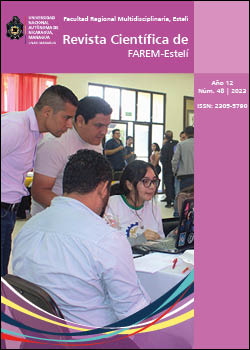Factors influencing English learning in students of FAREM-Matagalpa: a case study
DOI:
https://doi.org/10.5377/farem.v12i48.17526Keywords:
Factors, affective, linguistic, cognitive, experiencesAbstract
The following article presents advances of a doctoral study, which aims to analyze the factors that facilitate or hinder the development of English language skills and meaningful learning in the English teacher training program. The present study is focused on the analysis of qualitative data, under a mixed approach research. For data collection purposes, first, an interview was administered to 6 high school teachers in order to learn about their experiences with respect to the research topic. Second, a classroom observation of the group of students under study was carried out for one semester. Third, an interview was applied to 4 students under the extreme case sample. The analysis was carried out using the grounded theory methodology. The results show that there is a robust relationship between affective and linguistic factors. They are frequently and harmoniously linked. Additionally, the factors tend to change as learners enter a new level of learning.
Downloads
References
Aguado, H., García, A., & Ríos, R. (2005). ¿Es posible realizar una enseñanza universitaria en inglés? Educación y Futuro Digital (9).
Alemán M., Navarro, O., Suárez, R., Izquierdo, Y., & Encinas, T. (2018). La motivación en el contexto del proceso enseñanza aprendizaje en carreras de las Ciencias Médicas. Revista Médica Electrónica, 40(04), 1257-1270. Recuperado de http://scielo.sld.cu/scielo.php?script=sci_arttext&pid=S1684-18242018000400032
Ames, C. & Archer, J. (1988). Achievement Goals in the Classroom: Student´s Learning Strategies and Motivation Processes. Journal of educational psychology. 80. 3, 260-267. Retrieved from: http://www.unco.edu/cebs/psychology/kevinpugh/motivation_project/resources/ames_archer 88.pdf
Ausubel, D. (1983). Psicología educativa: Un punto de vista cognoscitivo. México, D.F: Editorial Trillas.
Ausubel, D. P. (1978). In defense of advance organizers: A reply to the critics. Review of Educational research, 48(2), 251-257. Recuperado de: https://journals.sagepub.com/doi/abs/10.3102/00346543048002251
Başbaği, L., & Yilmaz, O. (2015). Autonomous foreign language learning. Journal of Languages and Culture, 6(8), 71-79. Doi: https://doi.org/10.5897/JLC2015.0338
Brand, S., Reimer, T., & Opwis, K. (2007). How do we learn in a negative mood? Effects of a negative mood on transfer and learning. Learning and instruction, 17(1), 1-16.
Cid, A., Pérez, A. y Sarmiento, J. (2016). Evaluación del programa del Practicum del grado de maestro de la Universidad de Vigo: su reconstrucción. REDU: Revista de Docencia Universitaria, 14(1), 285-320. Doi: 10.4995/redu.2016.5796
Cortés, A. (2009). «La educación a distancia y el estudio independiente». Revista e-Formadores. No. 1., pp. 1-6. Disponible en: http://investigacion.ilce.edu.mx/panel_control/doc/e-formadores.pdf. [20/10/2017].
Dweck, C. (2015). Carol Dweck revisits the “growth mindset”. Education Weekly, 35(5), 20-24. Retrieved from http://www.edweek.org/ew/articles/2015/09/23/carol-dweck-revisits-the-growth-mindset.html
Ellis, R. (2004). The study of second language acquisition. Oxford: Oxford University Press.
Ellis, R. (2004). The study of second language acquisition. Oxford: Oxford University Press.
Espinoza, E. (2021). Importancia de la retroalimentación formativa en el proceso de enseñanza-aprendizaje. Revista Universidad y Sociedad, 13(4), 389-397.
Gamlo, N. (2019). EFL Learners’ Preferences of Corrective Feedback in Speaking Activities. World Journal of English Language, 9(2), 28-37. DOI: 10.5430/wjel. v 9n2p28
Gardner, R. (2007). Motivation and Second Language Acquisition. University of Western Ontario: Ontario.
Gardner, R., & Lambert, W. (1972). Attitudes and Motivation. London: Newbury House.
Gholami, R. (2012). Social Context as an Indirect Trigger in EFL Contexts. Issues and Solutions. Published by Canadian Center of Science and Education, Vol.5, No.3; Octubre 2022 Recuperado de www.ccsenet.org/elt
Glaser, B. G. (1992). Basics of grounded theory analysis. California, Estados Unidos de América: Sociology Press.
Harmer, J. (1983). The Practice of English Language Teaching. London: Longman.
Hernández, N. (2014). Categorías en el léxico bilingüe: Perspectivas desde el priming semántico interlenguas y la disponibilidad léxica. Revista electrónica de Lingüística Aplicada 13(1), 19-38.
Hernández, R., Fernández, C., & Baptista, P. (2014). Metodología de la Investigación. México, DF: McGraw-Hill.
Krashen, S. (1987). Principles and practice in second language acquisition. Prentice-Hall International.
Lambert, W. E. 1955: Measurement of the linguistic dominance of bilinguals. Journal of Abnormal and Social Psychology, 50, 197–200.
Lambert, W. E. 1955: Measurement of the linguistic dominance of bilinguals. Journal of Abnormal and Social Psychology, 50, 197–200.
Luna, E. (2005). Los factores afectivos en las programaciones de cursos. La motivación. Tesis de maestría. Universidad de Antonio de Nebrija.
Martínez, M. (2014). Estrategias para promover el desarrollo del Aprendizaje Autónomo en el alumno de Matemáticas I del nivel medio superior (Tesis de maestría). Universidad Autónoma de Nuevo León, México
Mejía, C., & Urrea, L. (1). La confianza en el aula como eje transformador del mundo escolar. Sophia, 11(2), 223-236. Recuperado a partir de https://revistas.ugca.edu.co/index.php/sophia/article/view/352
Mitchell, R., & Myles, F. (2004). Second language learning theories, 2nd edition. London: Hodder Arnold.
Muñoz, M. (2009). La influencia del tipo de actividad en la ansiedad en los alumnos chinos de español como lengua extranjera. Suplementos de Sino ELE, 2,1-41
Oñate, O. (2016). Factores que inciden en el dominio del inglés a nivel universitario. INNOVARE, Revista Electrónica de Educación Superior, 1(1), 66-99. Recuperado de http://innovare.udec.cl/wp-content/uploads/2016/08/0719-7500.2016.4.pdf
Ramírez, E, & Rojas, R. (2014). “El trabajo colaborativo como estrategia para construir conocimientos”. En: Revista Virajes, Vol. 16, No. 1: 88-101. Manizales: Universidad de Caldas.
Santana, J. del C., García-Santillán, A., & Escalera-Chávez, M. E. (2016). Variables que influyen sobre el aprendizaje del inglés como segunda lengua. Revista Internacional De Lenguas Extranjeras / International Journal of Foreign Languages, (5), 79–94. https://doi.org/10.17345/rile5.1004
Snow, E. (2002). Teachers´ perceptions and use of classroom space. 1-130. Retrieved from: http://www.coe.uga.edu/sdpl/research/teachersperceptions.htm
Tapia M., V., & Luna A., J. (2008). Procesos cognitivos y desempeño lector. Revista De Investigación En Psicología, 11(1), 37–68. https://doi.org/10.15381/rinvp.v11i1.3873
Torres, E. y Celis, A. (2015). Actitudes antes el aprendizaje de los estudiantes de la escuela superior de computo del instituto politécnico nacional, como aprendices del siglo XX1. Revista iberoamericana de contaduría, economía y administración 4(8).
UNAN-Managua (2020). Diseño curricular para desarrollar competencias en la UNAN-Managua.
Yin, R. (1994). Case Study Reseach: Design and Methods. London: Sage publication, Thousand Oaks, CA.
Published
How to Cite
Issue
Section
License
Copyright (c) 2024 Revista Científica de FAREM-Esteli

This work is licensed under a Creative Commons Attribution-NonCommercial-ShareAlike 4.0 International License.

